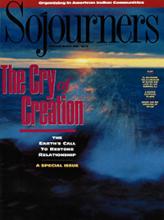SITTING ON HIS PORCH in a southwest Virginia holler, with the late-afternoon sun shining down, Richard Cartwright Austin is a man in his element. An ordained Presbyterian minister who has lived in various urban areas, Austin's vocation has grown to include a commitment to environmental theology.
After a decade of pastoral ministry in Appalachia, Austin's experience with the destruction of his locale by strip mining led him to coordinate the West Virginia Mountain Project, and eventually to be a national organizer for a project to secure federal legislation to end the strip mining of coal. The legislation he drafted was passed by Congress and eventually was signed into law by President Jimmy Carter.
As Austin was preparing to return to his primary call of pastoring, he realized that his faith addressed the experiences he and his parishioners had shared in their struggles against the devastation of the land. Since that time Austin has been developing a theological basis for understanding the relationships among God, people, and creation.
The laboratory in which Austin does his study is Chestnut Ridge Farm, near the coal fields of southwest Virginia. With his wife, Anne Leibig, a Gestalt therapist, he farms his land -- a small, self-sufficient, organic vegetable and maple syrup farm -- relying on the power of his two teams of horses, both for work and for fertilizer.
Bob Hulteen and Brian Jaudon visited Dick Austin on his farm in November 1989.
-- The Editors
Sojourners: I want to start by asking you about your experience of farming, both as a business and as a lifestyle.
Read the Full Article

